After inclement weather washed away Wednesday’s series finale against the Atlanta Braves, the Chicago White Sox traveled to Kansas City to begin their first road trip of the season. Close games have been the early trend for the Sox. Four of their first five were decided by one run for the first time since 1992.
The Cubs got Thursday off ahead of the juggernaut Los Angeles Dodgers rolling into town, followed by a nine-game West Coast trip to San Diego, Seattle and Arizona. The Cubs will start right-hander Kyle Hendricks and left-handers Jordan Wicks and Shota Imanaga against the Dodgers.
Every Friday during the regular season, Tribune baseball writers will provide an update on what happened — and what’s ahead for the Cubs and White Sox. Want more? Sign up for our new newsletters.
Cubs hitters focused on approach over results in early weeks
The first couple of weeks, let alone the first two series of the seasons, can skew a player’s numbers — good or bad.
Through conversations with other hitters during his career, Cubs first baseman Garrett Cooper, in his eighth big-league season, said getting the first hit each season is the hardest and that every player is searching for that initial one. Just as it can be a trap to read into spring training performances, there is danger in putting too much stock in the first month of at-bats, regardless of results.
“You just try to put yourself in the best position at-bat by at-bat,” Cooper told the Tribune. “I mean, early on in the year everyone is amped up, starters are throwing the hardest they’ll probably throw all year. Guys are as jittery in the box as they will be all year until the playoffs start.
“So you try to take that first hit out of the way and try to calm down after that, especially for some young guys who’ve had success in the minor leagues who come up here.”
There can be a danger in hitters trying to tinker too much early in the season, particularly if their process is sound despite not yielding hits. Veterans can be helpful to younger players early in the season as they get their footing; Cooper recalled how valuable Martin Prado, Curtis Granderson and Neil Walker were as resources when he first came up with the Miami Marlins.
“If you start changing things after 10, 20 at-bats, it’s going to be a long season,” Cooper said. “I can tell you from experience when you start tinkering with your hands, you start tinkering with your setup, it can go sideways quickly because 20 at-bats can turn into 100 quick — and then the next thing you know you’re in a bigger hole than you were.
“Just learning from older guys that you’re going to have four balls hit 105 mph that are outs and you’re going to have four that are 70 mph hits. It’s the fun game we play. Some luck has to be on your side as a hitter and you just try to put together the best at-bat you can.”
This balance isn’t much different from what hitters face throughout a season. Cubs manager Craig Counsell understands that well as a former infielder who spent 16 seasons in the majors.
“There’s a lot of luck day to day in hitting, and that’s mentally challenging always,” Counsell said. “There’s good swing, bad result. ‘Do I change my swing?’ Every hitter goes through that, absolutely. There’s bad swing, good result. ‘Oh, I’m great.’
“The good hitters stick to: ‘This is my process, this is how I prepare. I have to be open to knowing myself and when something’s wrong and when I’m just running into some bad luck or the pitcher made a good pitch,’ which happens a ton as well. You have to be a good self assessor from that perspective.”
Three of the Cubs’ typical first four hitters in the lineup appear locked in. The production has come, too, for Seiya Suzuki, Ian Happ and Christopher Morel, who have recording nine hits apiece this season.
But more importantly, results aside, that trio and the rest of the lineup has displayed a good approach. The Cubs’ 33 walks are third in the majors behind the Pittsburgh Pirates (38) and the Dodgers (39), who have played one and three more games, respectively.
‘Constant communication’ fuels Martín Maldonado’s connection with Sox pitching staff
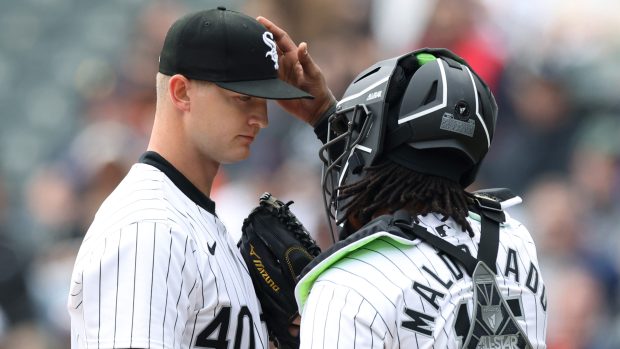
Maldonado told the Tribune he felt like “a kid going to school” hours before opening day last week at Guaranteed Rate Field.
“First day, you’re always excited,” he said.
The catcher has received high marks for his early work with the Sox pitching staff.
“The way he navigated that game and the communication in between innings and with the umpire and our pitchers and our pitching coaches and me, there’s a reason why he’s been to three World Series and six postseasons,” manager Pedro Grifol said after Tuesday’s 3-2 victory against the Braves.
Maldonado signed a one-year deal with the Sox after spending portions of the last six seasons with the Houston Astros. His 62 postseason starts at catcher are the third-most in major-league history.
“Just the experience, the knowledge,” Grifol said. “This guy is catch-first before anything. He gets here early, he does his own work, then he filters his work with the work that we do, puts it all together and develops a game plan and carries it out like no other.
“And his ability to adapt and adjust during the game, based on (the) pitcher’s strengths that day and hitters’ weaknesses and what he has seen, (is) second to none. I’ve seen smart catchers. He’s certainly one of the smartest ones I’ve ever been around.”
Maldonado said a key to working with a new pitching staff is “a lot of constant communication, talking to each other and understanding what they do.”
He made an instant connection with Garrett Crochet, who allowed two runs while striking out 16 in 13 innings in his first two starts.
“He’s caught some incredible guys in the past and his track record is definitely unmatched,” Crochet said Tuesday. “For a young guy like myself, to really be able to lean on him has been awesome.”
Number of the week: .994
The Sox emphasized improving their defense in the offseason, and so far it’s paying off. The team’s .994 fielding percentage entering Thursday was the best in the American League.
Week ahead: Cubs
- Friday: vs. Dodgers, 1:20 p.m., Marquee
- Saturday: vs. Dodgers, 3:05 p.m., Marquee, FS1
- Sunday: vs. Dodgers, 1:20 p.m., Marquee
- Monday: at Padres, 8:40 p.m., Marquee
- Tuesday: at Padres, 9:05 p.m., Marquee
- Wednesday: at Padres, 5:40 p.m., Marquee
- Thursday: Off
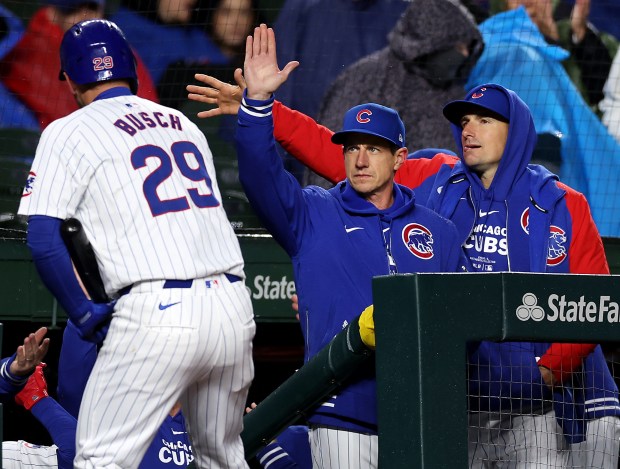
Counsell has taken advantage of his full roster with every hitter appearing in at least three of the Cubs’ first six games. Miles Mastrobuoni is the lone position player not to get a start, though he has played a key role as a late-inning replacement, including scoring the go-ahead run after pinch hitting in the eighth inning of Wednesday’s 9-8 win over the Colorado Rockies.
Counsell has shown a willingness to utilize different lineups based on matchups, both against the opposing pitcher and who starts for the Cubs that day. He hasn’t been shy, either, about using the full bullpen. All eight relievers have thrown at least 2 2/3 innings heading into the weekend.
Players lauded Counsell in spring training for how he seems to play to each player’s strengths, something that should only increase as he continues to get to know his team. President of baseball operations Jed Hoyer believes Counsell will continue to use the roster with that approach.
“Managers that can really use their whole bench, use their whole bullpen, who can get everyone involved, it pays off when you have an injury and the guy is forced into action,” Hoyer said this week. “You’ve seen that already. I do think one of our strengths as a team, and we don’t have a lot of holes, is you continue to use our bench and use those guys because I think that’s our best roster.”
Week ahead: White Sox
- Friday: at Royals, 6:40 p.m., NBCSCH
- Saturday: at Royals, 6:10 p.m., NBCSCH
- Sunday: at Royals, 1:10 p.m., NBCSCH
- Monday: at Guardians, 4:10 p.m., NBCSCH
- Tuesday: at Guardians, 5:10 p.m., NBCSCH
- Wednesday: at Guardians, 5:10 p.m., NBCSCH
- Thursday: Off
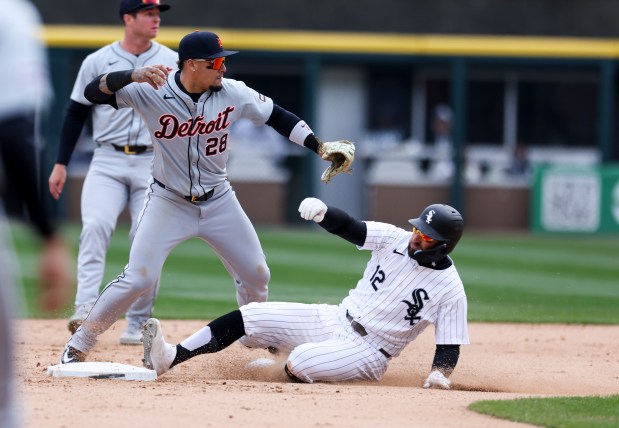
The Sox played just three division games during the first month of the 2023 season.
They’ve already played four this year — three against the Detroit Tigers and one against the Kansas City Royals — and they’ll continue a four-game series at Kauffman Stadium this weekend before heading to Cleveland for three games — and a total solar eclipse Monday.
The Sox went 23-29 in the AL Central last season, losing 18 of their last 26. They were 0-3 this season heading into Thursday night’s game against the Royals.
What we’re reading this morning
- Column: The Christopher Morel experiment is a work in progress for the Cubs
- For Cubs rookie Ben Brown, his next big-league outing was a chance to settle in
- White Sox gain 1st win of 2024 behind Garrett Crochet’s 7 strong innings: ‘This one, you know what, he wanted it’
- Athletics will leave Oakland and play the next 3 seasons in minor league park near Sacramento
- Voters resoundingly rejected a stadium tax for Royals and Chiefs — leaving their future in Kansas City in question
- Why were the White Sox briefly missing a first-base coach? Manager Pedro Grifol explains.
- Bob Uecker begins his 54th season broadcasting Brewers games after turning 90 earlier this year
This week in Chicago baseball
April 7, 1970: Nancy Faust plays the organ at Comiskey Park during a White Sox game, becoming the first female organist in MLB history.
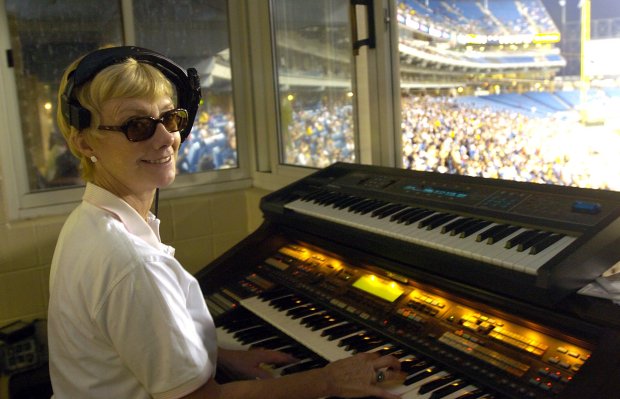
Faust, a beloved fixture as the White Sox organist for 40 years, played her swan song at the end of the 2010 season.
“It won’t be easy, but the timing is just right to move on,” she said. “Next year will be my 41st season. Never did I imagine that I would be saying that.
“The truth is, as soon as they won the World Series (in 2005) and I started to negotiate for the next year, one of the suggestions I threw out was: ‘Well, perhaps one of the things you want me to do is only play during day games.’ They heartily agreed that was a great idea. That sent a message to me. That would be an easy way to make a transition for them. The fact that they agreed to it made me feel like I was doing the right thing.
“I don’t want to overstay myself. I have known for five years that that was the most that I could possibly do.”
Faust grew up in Chicago, learning how to play the organ at age 4. She earned a degree from North Park College with plans to become a teacher. But after playing at sporting events for a year, she was hired by Sox general manager Stu Holcomb, who had seen her perform at a banquet.
Combining pop and rock music with catchy commercial tunes, Faust pioneered the concept of playing a song that related to the name or personality of a player when he came to bat.
In 1977, she revived the tune “Na Na Hey Hey Kiss Him Goodbye” and played it when the opposing pitcher was yanked, a Sox player hit a home run or after a Sox victory.
April 7, 1971: Harry Caray calls his first White Sox game
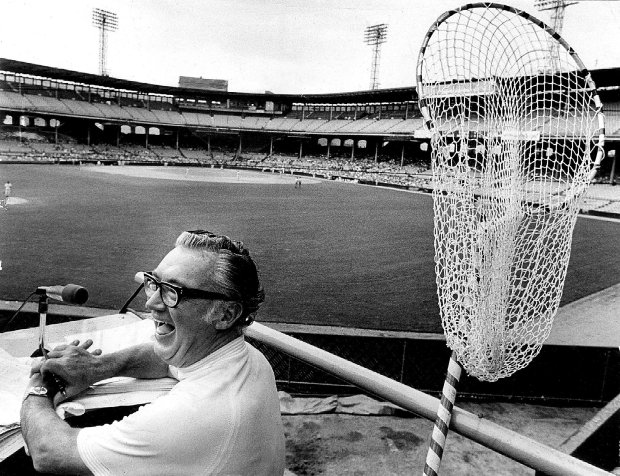
Having hit rock bottom the year before with 106 losses and total home attendance of just 495,355, the Sox opened their season with new uniforms, a new manager in Chuck Tanner and a new radio announcer in Harry Caray.
Caray made his regular-season debut in Oakland, the same place he ended the 1970 season after a fitful year covering the Athletics and clashing with owner Charlie Finley, broadcast partner Monte Moore and others (although Caray later said he and Finley got along).
There would be conflicts during his 11 seasons with the Sox, too, which ultimately drove him across town to become the voice of the Cubs.
It was hard to hear Caray early on with the Sox, as powerful WMAQ-AM dropped the team after the 1970 season. None of the big Chicago radio stations wanted them, so the Sox wound up airing on a weak ad hoc network of four FM stations and one AM outlet outside the city. Each was paid $25 a game to carry the Sox broadcasts, and the team sold its own advertising, keeping the revenue, according to Don Zminda’s 2019 biography, “The Legendary Harry Caray: Baseball’s Greatest Salesman.”
The stations were Evanston’s WEAW-FM, Joliet’s WJOL-FM, Dundee’s WVTV-FM, Lansing’s WLNR-FM and La Grange’s WTAQ-AM. Caray would complain no one could hear his broadcasts, a gripe he would reprise when he moved primarily to TV and WSNS-Ch. 44 in 1973.
Caray’s first broadcast partner with the Sox was Ralph Faucher, who happened to be WTAQ’s sales director and would occasionally broadcast high school football and basketball games.
But after two seasons of Caray calling the action, Sox radio broadcasts were back on WMAQ.
April 7, 1994: Michael Jordan has two hits for the Sox in an exhibition game vs. the Cubs at Wrigley Field
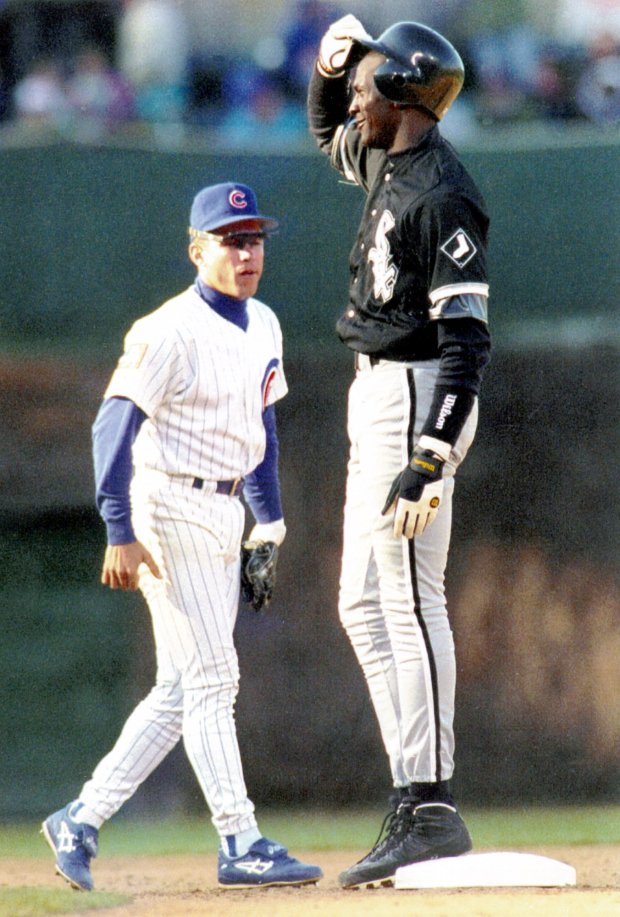
Jordan singled, doubled and knocked in two runs to lift the White Sox to a 4-4, 10-inning tie with the Cubs in front of 37,825 at Wrigley Field.
When he received a standing ovation as he stepped to the plate in the second inning, it had to be the first time in history North and South Siders agreed on anything.
“Who would ever think I would be out there playing in Wrigley Field?” he said. “It was a great feeling just to come out there and do well.”
Jordan can tell his grandchildren that he played in one of baseball’s historic ballparks. And the actual major-leaguers can brag about playing with the greatest athlete of their time.
“I wanted him to hit for the cycle,” Cub shortstop Shawon Dunston said. “He might have been playing for the Sox, but he is Chicago. Let’s not fool ourselves.”
Quotable
“You try to build up as much depth as possible. If any one of my peers were sitting in this seat and they said they’re confident they have enough pitching, they’re lying.” — Jed Hoyer on the Cubs’ confidence they had enough pitching before Justin Steele’s injury




